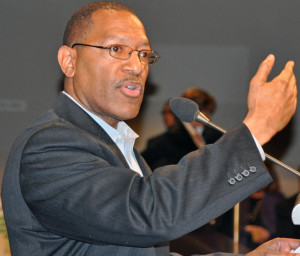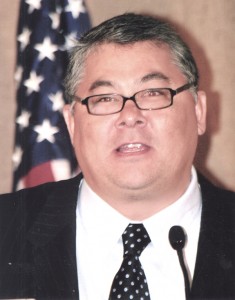Small Local Contractor Asks: Where is Oakland’s Level Playing Field
Apr 18, 2013
Posted in Army Base Jobs, City Auditor’s Report
From the point of view of Turner Group Construction –a local, small African-American owned firm – the company has experienced nothing but headaches since it has tried to work for the City of Oakland. The company has found out first-hand why many small contractors consider the city’s “level playing field “ to be anything but.
Most recently, the company demanded a retraction from City Auditor Courtney Ruby’s March Performance Audit that focused on
allegations that two City Council members unethically attempted to direct business to the Turner Group.
According to the firm’s retraction demand, the report, which mentioned Turner Group 26 times, “implies that Turner engaged in
unethical conduct, when in fact Turner was simply reacting, ethically and legally, to the highly unusual decision of city staff to improperly sole source contracts to a politically influential, out-of-town company.”
Ruby took only three days to dismiss the complaint. “We decline your request to alter the report,” she said in her April 12 reply.
“Please be advised that at no point…(did the report) conclude that Turner Group Construction engaged in unethical conduct. The ethics of Turner’s conduct was outside the scope of the audit.”

The twists and turns experienced by Turner Group in Oakland were the opposite of an open and transparent process. First, Turner Group was part of a consortium that was recommended to be part of the Army Base Project. Then the recommended award was withdrawn after contractor Phil Tagami complained, though he was not a party to the bidding process and had not yet received the Exclusive Negotiating Agreement (ENA) on the project.
Next, city staff tried to give a sole source, no bid contact to do the Army base work to Top Grade Construction, part of the Tagami team. The size of the award more than doubled.
At that point, Top Grade offered Turner Group what it considered a menial “pass through” contract, a small slice of the deal to buy the firm’s silence. Turner Group refused the deal.
Councilmembers Desley Brooks and Larry Reid opposed the staff-approved no bid contract, saying it violated the city’s requirements for open bidding.
Ultimately on June 19, 2012 the City Council gave the award to the Downrite Corporation, the lowest bidder.
The final insult – from Turner Group’s point of view – was to have its reputation maligned by the City Auditor, who did not even seek to interview them in her report.
Going back to the beginning, the sun seemed to be shining on Turner Group Construction in August 2009 when the city conducted open bidding to award the Oakland Army Base demolition and remediation (Building 6) project, which was worth at least $2 million but would later go as high as $6 million between two contracts.
PARC Services was the lowest bidder. PARC was made up of a consortium of contactors that included Turner Group and other local contractors.
“The preliminary staff recommendation is to select PARC Services for the job,” according to an Oct. 9 email written by John Monetta, the city’s real estate manager.
Though small, Turner Group is well known and respected for its work in Oakland. The company has a reputation for going out its way to create opportunities for the formerly incarcerated.
Turner Group’s successful projects and their contract dollar amount include Alameda County, ($6 million), Oakland Unified School District ($17 million), Kaiser Hospital ($4 million) and San Francisco Boys and Girls Club ($3.5 million).

But almost immediately, the deal began to go south. Phil Tagami, who was negotiating at that time to become master developer of the Army Base project, told staff to withdraw the offer to PARC Services.
“(We) must insist that the bid solicitation be rejected and the process significantly revised with our direct involvement before being re-started,” Tagami wrote in an Oct. 15, 2009 email to Walter Cohen, then director to Oakland’s Community and Economic Development Agency.
Tagami wanted the contact to go a company that was part of what he called his team, Top Grade Construction, a large firm based in Livermore.
Without a word, city staff withdrew the award recommendation. A year and a half passed with no action on the demolition contact.
When the contact reappeared, staff was tying to hand the job to Top Grade, without sending the contact out to public bid.
the job to Top Grade, without sending the contact out to public bid.
At the same time, the amount of money on the table was increased. The staff in June 2011 wanted to give Top Grade two sole source contracts, one for $1,676,750 and another for $2 million, an open-ended contract that could rise as high as $4 million.
At this point, it looked like the award to Top Grade was clear sailing, The obstacles, however, were Councilmembers Desley Brooks and Larry Reid, who were demanding that staff follow the city’s open bidding rules.
Apparently certain the company had the contacts in the bag, Top Grade CEO and President Bill Gates in June 2011 sent emails to Turner Group, offering what he called a “mentoring program.”
The offer: Turner Group would “manage $362,240” on the project and receive $15,000 to install fencing and straw on the Army Base site and $31,567” in management fees,” according to an email sent by Gates to Len Turner, president of Turner Group on June 16, 2011.
The contactors who would do the bulk of the work would be companies picked by To Grade and paid with joint checks provided by Top Grade.
Len Turner rejected this offer, viewing it as a “pass through” deal, designed to buy his company’s silence and acceptance of Top Grade’s sole source agreement.
Turner did not look at the deal as a legitimate offer to manage a project but as a bit of “handyman work” putting up fence and installing straw.
“From our viewpoint, our portion is 10 percent to be a silent partner,” Turner wrote in an Aug. 22, 2011 email.
“We don’t interview our subs and/or help negotiate pricing. The subs are being passed over to Turner Group with joint checks being provided by Top Grade.”
“Turner group is being handicapped, and this is not the type of partnership Turner Group is looking for Turner Group has a lot to offer, and if this is the final offer, we respectfully decline the offer,” Turner wrote to Gates.
Ken Houston, senior vice president of Turner Group, was not impressed with what he considered Gate’s empty words about “future job opportunities at the Oakland Army Base…(for) training local minorities.”
This deal was promoted with city staff’s knowledge. According to Gates, copies of his emails to Turner Group were submitted to city staffers.
When Gate’s sole source contract failed to be approved by the City Council, staff ultimately conducted an open bidding process, which was won by Downrite Corporation, an Oakland-based firm, a victory for City Council members who had fought for the open process.
Few members of the public would have known the story behind this contract if it had not been for the City Auditor’s March 21 report, which dragged the facts of this case into the spotlight.